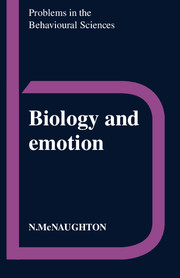Crossref Citations
This Book has been
cited by the following publications. This list is generated based on data provided by Crossref.
Buck, Ross
1990.
Mood and Emotion: A Comparison of Five Contemporary Views (Book).
Psychological Inquiry,
Vol. 1,
Issue. 4,
p.
330.
Voorzanger, Bart
1990.
From Ideological Critique to the Methods and Morals of Science.
Politics and the Life Sciences,
Vol. 9,
Issue. 1,
p.
135.
Mullen, Paul E.
1991.
Jealousy: The Pathology of Passion.
British Journal of Psychiatry,
Vol. 158,
Issue. 5,
p.
593.
LANG, ANNIE
and
FRIESTAD, MARIAN
1993.
Emotion, Hemispheric Specialization, and Visual and Verbal Memory for Television Messages.
Communication Research,
Vol. 20,
Issue. 5,
p.
647.
Mcguffin, Peter
Asherson, Philip
Owen, Michael
and
Farmer, Anne
1994.
The Strength of the Genetic Effect.
British Journal of Psychiatry,
Vol. 164,
Issue. 5,
p.
593.
Griffiths, P. E.
1994.
Cladistic Classification and Functional Explanation.
Philosophy of Science,
Vol. 61,
Issue. 2,
p.
206.
Griffiths, Paul
1999.
Author’s response.
Metascience,
Vol. 8,
Issue. 1,
p.
49.
Triemer, Antje
and
Rau, Renate
2001.
Stimmungskurven im Arbeitsalltag - eine Feldstudie.
Zeitschrift für Differentielle und Diagnostische Psychologie,
Vol. 22,
Issue. 1,
p.
42.
Mandler, George
2003.
Handbook of Psychology.
p.
157.
Gray, Jeffrey A.
and
McNaughton, Neil
2003.
The Neuropsychology of Anxiety.
McMillan, Franklin D.
2005.
Mental Health and Well‐Being in Animals.
p.
93.
BARBALET, JACK
2005.
Weeping and Transformations of Self.
Journal for the Theory of Social Behaviour,
Vol. 35,
Issue. 2,
p.
125.
Barrett, Lisa Feldman
2006.
Are Emotions Natural Kinds?.
Perspectives on Psychological Science,
Vol. 1,
Issue. 1,
p.
28.
Smillie, Luke D.
2008.
The conceptualisation, measurement and scope of reinforcement sensitivity in the context of a neuroscience of personality.
European Journal of Personality,
Vol. 22,
Issue. 5,
p.
411.
McNaughton, Neil
and
Corr, Philip J.
2008.
The Reinforcement Sensitivity Theory of Personality.
p.
44.
McNaughton, Neil
and
Corr, Philip J.
2008.
The Reinforcement Sensitivity Theory of Personality.
p.
95.
Campos, André
Dignum, Frank
and
Dignum, Virginia
2009.
Engineering Societies in the Agents World IX.
Vol. 5485,
Issue. ,
p.
264.
McNaughton, Neil
and
Corr, Philip J.
2009.
Handbook of Neuroscience for the Behavioral Sciences.
Ng, Kwai Hang
and
Kidder, Jeffrey L.
2010.
Toward a Theory of Emotive Performance: With Lessons from How Politicians Do Anger.
Sociological Theory,
Vol. 28,
Issue. 2,
p.
193.
Reading, Anthony
2011.
Meaningful Information.
Vol. 1,
Issue. ,
p.
111.



